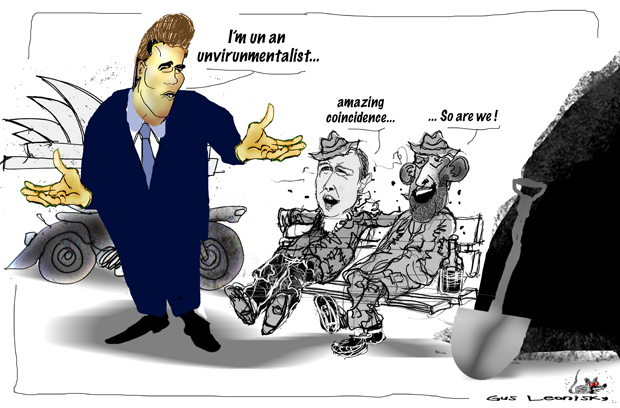Search
Recent comments
- whoever they are....
1 hour 36 min ago - unaligned world....
1 hour 49 min ago - larry johnson.......
1 hour 55 min ago - patriotism....
11 hours 58 min ago - belittling russia......
12 hours 26 min ago - Запад толкает Украину на последнюю битву....
12 hours 39 min ago - fourteen points....
12 hours 49 min ago - der philosophische glaube....
13 hours 9 sec ago - seriously?...
13 hours 14 min ago - AfD....
13 hours 41 min ago
Democracy Links
Member's Off-site Blogs
on a great winter day, 21 C in the shade, in sydney, the terminator is trying to terminate CO2 emissions...

Arnold Schwarzenegger is apparently on a mission to terminate the myth that protecting the environment hurts the economy.
The actor and former politician is in Australia to promote his new film Terminator Genisys, the first a planned new trilogy for the popular movie franchise.
During his stint as governor of California between 2003 and 2011, Schwarzenegger passed the first emissions trading scheme in the United States.
He has said all countries, including Australia, need to lift their game when it comes to tackling climate change.
“In order for us to be successful the whole world has to work together ... Australia, Austria, the US – everybody has to work together,” Schwarzenegger told Channel Ten’s The Project on Friday night.
- By Gus Leonisky at 6 Jun 2015 - 3:10pm
- Gus Leonisky's blog
- Login or register to post comments
Contrary to the carbon claptrap put out by Abbott...
Contrary to the carbon claptrap put out by Abbott and his Minister for Environment, the world is moving fast on carbon pricing with 25% of GHG emissions now with a price on carbon. Dr Anthony M Horton jumps into the vacuum vacated by our Federal Government to give you the real facts.
IN HIS keynote address at the Business and Climate Summit, French President Francois Hollande echoed a message from hundreds of global businesses who support ambitious climate policies.
Carbon pricing is essential to move to a low carbon economy according to Hollande, and during the Summit, business leaders repeatedly asked governments for a price on carbon to facilitate increased investment in low-carbon solutions.
The World Bank Group recently released its Carbon Pricing Watch report which reported 40 national and 20 sub national jurisdictions (representing approximately 25 per cent of global greenhouse gas emissions) now have a price on carbon. In the past ten years, pricing instruments have increased threefold and now represent 7 Gigatonnes of carbon dioxide.
https://independentaustralia.net/environment/environment-display/world-carbon-pricing-nearing-critical-mass--sorry-mr-hunt,7787
Meanwhile:
... the Guardian have published a beautiful—and terrifying—multimedia story from deep inside China's coal belt. It's the third installment in the paper's ongoing "carbon bombs" series: investigations into giant fossil fuel projects from around the world that are super-charging global warming, or that have the potential to do so. Today's deep-dive into China's ravenous use of coal is eye-opening not only because it explores the long-lasting impact of burning coal on the nation's health, but also because it illustrates the country's outsized impact on global climate change through coal-related emissions. Here are some highlights from the Guardian story (which you should also check out for the gorgeous video and graphics)...
read more: http://www.motherjones.com/environment/2015/06/china-coal-carbon-climate-guardian
some stats...
http://www.climatecouncil.org.au/ever-wondered-when-the-last-coldest-year-on-record-was
and:
Australia is lagging behind the world's major economies when it comes to renewable energy generation despite having enough renewable energy resources to power the country 500 times over.
Globally, renewable energy is now cost-comparative or cheaper than fossil fuels for generating electricity, and the cost of wind and solar in particular is projected to continue to fall steeply.
Investment and jobs in renewable energy have surged internationally. Clean energy investment grew in China (32%), the US (8%), Japan (12%), Germany (3%) and the UK (3%) in 2014. Whilst in Australia, investment fell 35% ( with investment in large-scale renewable energy falling 88%), due to policy uncertainty.
DOWNLOAD THE REPORT
FOUR KEY FINDINGS
1.Renewable energy is booming globally, with strong growth in investment and jobs. In contrast, though, Australian jobs and investment in the renewable sector have fallen sharply.
2. An important driver for the global renewable energy acceleration is the steep decline in costs of wind and solar. Hundreds of thousands of Australian households have benefited with solar PV panel prices falling 75% in the last 5 years.
3. Countries with consistent long-term renewable energy policies are attracting growth.
4. Australia has excellent renewable energy resources, but is missing out on the global renewable boom due to policy uncertainty and threats to wind back the Renewable Energy Target.
mining to environmentalists: clean up after we mess up...
Shouting down or starving out those with whom we disagree can seem so much easier than confronting their arguments.
Take the mining industry’s latest effort to diminish the power of environmentalists seeking to stop new coalmines and coal seam gas wells.
Their submissions to the innocuous sounding parliamentary “inquiry into the register of environmental organisations” start with reasonable-sounding arguments – that environmental groups entitled to receive tax deductible donations should not use the money to pay court fines for protesters who have broken the law.
But they quickly get to their their real point: that conservationists should only be allowed to receive tax deductible donations if they limit themselves to “on the ground activities”, unthreatening things such as tidying up or planting trees, and give up on advocacy about touchy things things like, say, climate change policy or keeping coal deposits in the ground.
The Minerals Council of Australia insists campaigns to stop new fossil fuel projects have an “ideological” rather than “environmental” objective. Climate change is, apparently, nothing to do with the environment. And it says “the right to free speech should not be conflated with an entitlement to taxpayer funded political activity”.
http://www.theguardian.com/australia-news/2015/jun/05/as-arguing-against-climate-change-action-gets-harder-the-naysayers-get-louder
Mining to environmentalists: "clean up after we mess up... then shut the f&^%k up"... on a day when the temperature is 21.8 C in the shade in Sydney, in winter...